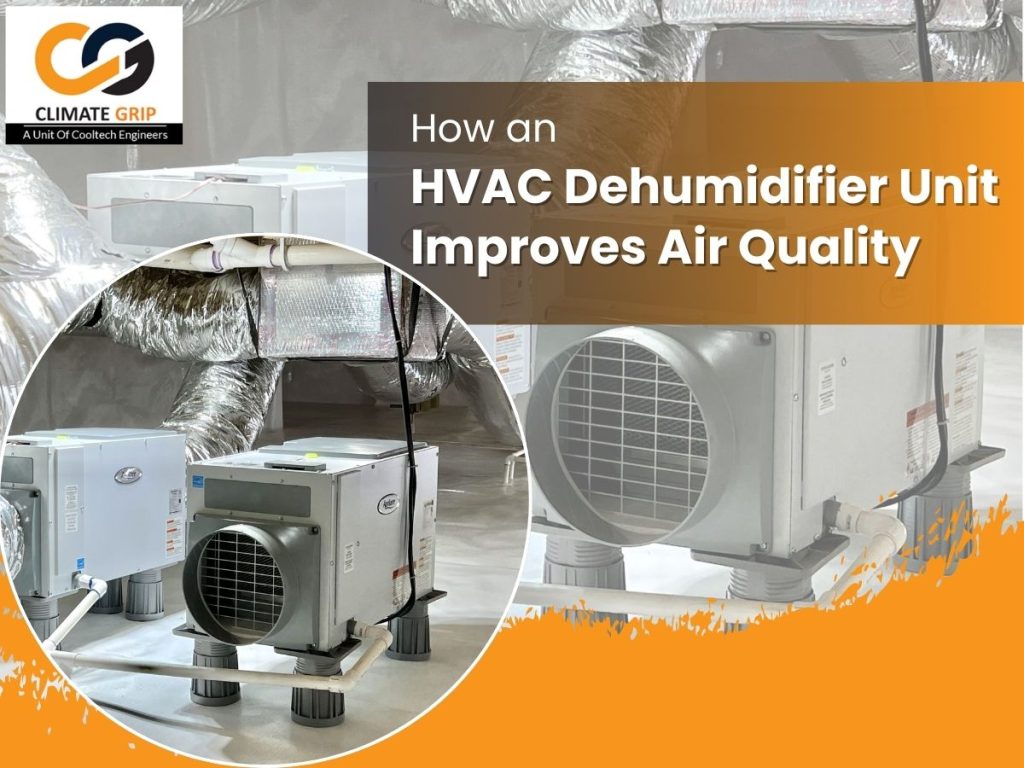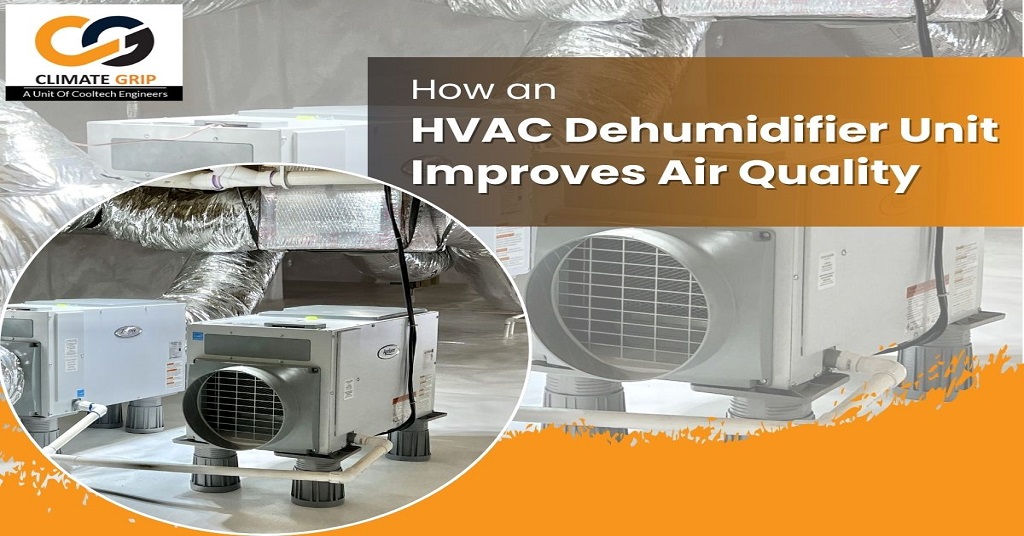
Indoor air quality is one of the most overlooked aspects of a healthy and comfortable home. While most people focus on heating and cooling, humidity levels are equally important. Too much moisture in the air can lead to mold growth, musty odors, and health issues such as allergies and asthma.
That’s where an HVAC dehumidifier unit comes in. Removing excess moisture directly through your heating and cooling system provides a whole-home solution to humidity problems. Unlike portable machines, which only handle one room at a time, a dehumidifier integrated with HVAC ensures consistent, clean air across your entire space.
In this guide, we’ll explore how an HVAC dehumidifier works, why it matters for air quality, the different types available, and how to choose the best HVAC dehumidifier units for your home.
What Is an HVAC Dehumidifier Unit?
Definition and Role in Indoor Air Quality
An HVAC dehumidifier unit is a device that connects to your central heating and cooling system to regulate indoor humidity. As air passes through the HVAC system, the unit extracts excess moisture before redistributing air into your living spaces. This balance prevents dampness, improves air freshness, and enhances comfort.
HVAC Dehumidifier Unit vs Portable Dehumidifiers
Why not just use a portable dehumidifier? The main difference lies in scope. A dedicated dehumidifier for HVAC manages the entire home or building, while a portable machine only covers one small area.
- Portable: Best for single rooms or basements.
- HVAC-integrated: Best for households that want consistent humidity control in every room.
A whole-house system is usually the better investment if long-term efficiency and convenience matter.
How Excess Humidity Impacts Indoor Air Quality
High humidity may seem harmless but quietly causes major air quality problems. Here's how:
- Mold and mildew growth: Moist air creates the perfect breeding ground for spores, which spread quickly throughout a home.
- Dust mites and allergens: Humidity above 60% encourages dust mites, which are common allergy triggers.
- Musty odors: Damp indoor environments often smell stale, signaling unhealthy air.
- Strain on HVAC system: Moisture makes the air feel warmer, causing your air conditioner to work harder, raising energy bills.
Without a proper dehumidification strategy, your indoor environment can become uncomfortable and even hazardous to your health.
How an HVAC Dehumidifier Unit Improves Air Quality
Removes Excess Moisture from the Air
By maintaining indoor humidity between 40–50%, your HVAC dehumidifier unit ensures that air feels fresh, dry, and breathable.
Reduces Mold, Bacteria, and Allergens
A drier environment discourages mold spores, bacteria, and dust mites from multiplying, directly improving respiratory health.
Enhances HVAC Efficiency and Comfort Levels
When humidity is under control, your air conditioner doesn’t need to overwork to maintain cooling. An energy-efficient dehumidifier HVAC system not only cuts energy costs but also extends the lifespan of your HVAC unit.
Types of HVAC Dehumidifier Solutions
Whole House Dehumidifier HVAC Systems
A whole-house dehumidifier HVAC system connects directly into the ductwork, treating every room evenly. This is the most comprehensive solution for households in humid climates or large homes.
Dedicated Dehumidifier for HVAC Units
In regions with extreme humidity, a dedicated dehumidifier for HVAC provides extra moisture removal capacity. These units are designed to run alongside the central system for optimal performance.
Commercial vs Residential HVAC Dehumidifiers
- Commercial units: Handle large-scale facilities, office spaces, or industrial buildings.
- Residential units: Tailored for homes and small properties.
Choosing the right category depends on square footage and usage needs. Benefits of Using an HVAC Dehumidifier Unit
- Improved air quality – Cleaner, drier air reduces allergens and makes breathing easier.
- Lower risk of structural damage – Excess moisture damages wood, walls, and insulation; dehumidification protects your home.
- Energy efficiency – Drier air feels cooler, meaning you can set the thermostat higher and save on energy bills.
- Longer HVAC lifespan – Less strain on your system prevents breakdowns and costly repairs.
Choosing the Best HVAC Dehumidifier Units
Key Factors to Consider
- Capacity: Match the dehumidifier size to your home’s square footage and typical humidity levels.
- Energy rating: Look for energy-efficient dehumidifier HVAC models to cut long-term costs.
- Noise level: Some units are quieter than others, which is essential for residential use.
Comparing Brands and Models
The market offers many options, but the best HVAC dehumidifier units typically balance performance, efficiency, and affordability. Well-known brands often provide warranties and better support.
Cost vs Long-Term Value
While upfront costs may be higher than portable dehumidifiers, the savings in energy bills, improved health, and home protection make an HVAC-integrated system a worthwhile investment.
Maintenance Tips for Optimal Performance
- Clean or replace filters: Keeps airflow clear and prevents bacteria buildup.
- Schedule annual inspections: A professional can spot issues before they become expensive.
- Check drain lines: Ensure proper water drainage to prevent leaks or backups.
- Monitor humidity levels: Use a hygrometer to keep humidity between 40–50%.
Regular upkeep ensures your system continues to deliver clean, dry air year-round.
Is an HVAC Dehumidifier Right for Your Home?
Do you need one? Here are signs you should consider adding an HVAC-integrated dehumidifier:
- Your home feels damp or sticky, even when the AC is running.
- You notice condensation on windows or walls.
- There are musty smells or visible mold patches.
- Family members suffer from allergies or respiratory issues.
- Energy bills are higher because your AC is overworking.
If these sound familiar, a whole-house dehumidifier HVAC could dramatically improve comfort and health in your home.
Conclusion
Indoor air quality is more than just temperature—it’s about humidity control. By installing an HVAC dehumidifier unit, you can:
- Prevent mold and allergens.
- Improve overall health and comfort.
- Reduce energy bills with an energy-efficient dehumidifier HVAC.
- Protect your home from long-term damage.
Whether you choose a dedicated dehumidifier for HVAC or a whole-house dehumidifier HVAC system, investing in air quality pays off in comfort, savings, and peace of mind.
When exploring the best HVAC dehumidifier units, consider your climate, home size, and budget. You’ll enjoy cleaner air and a healthier home environment for years with the right choice.

